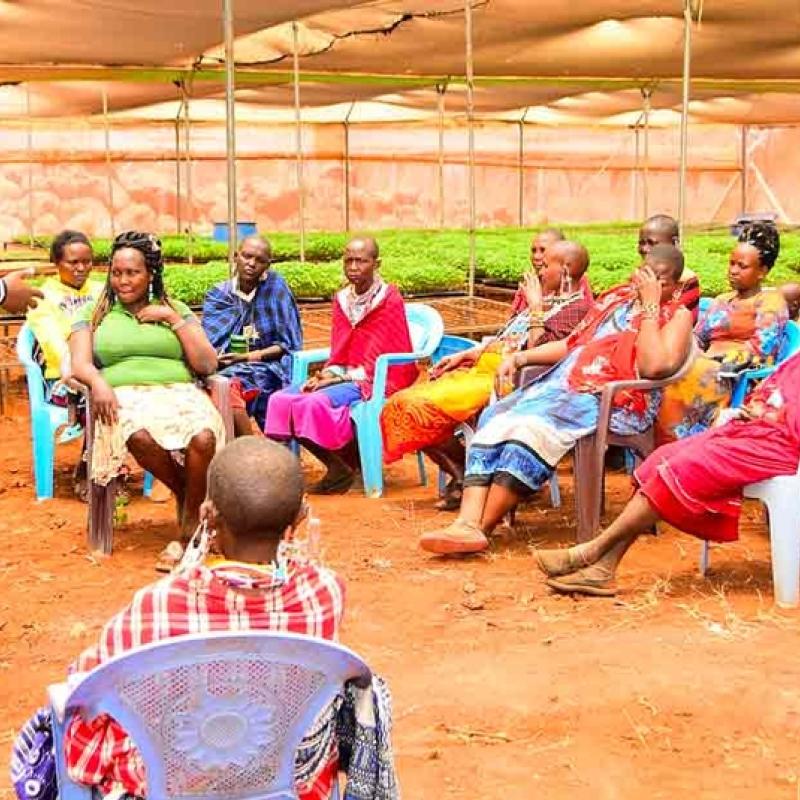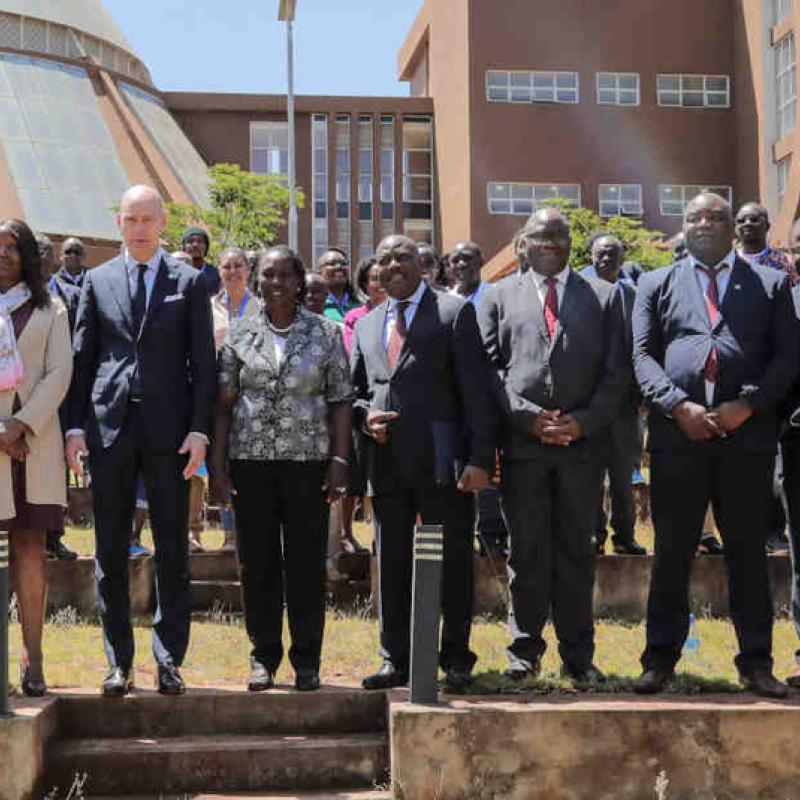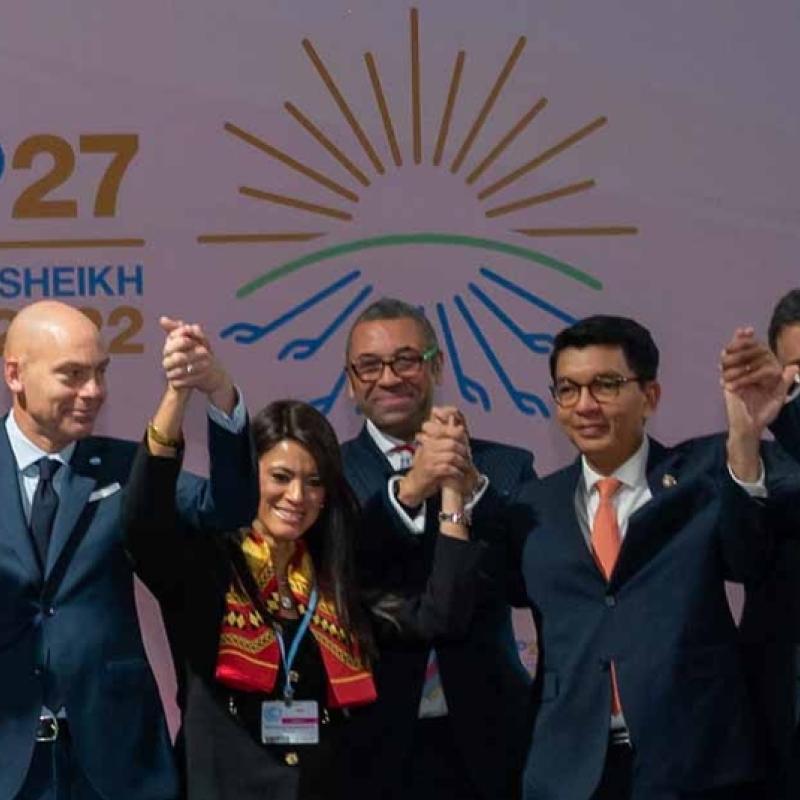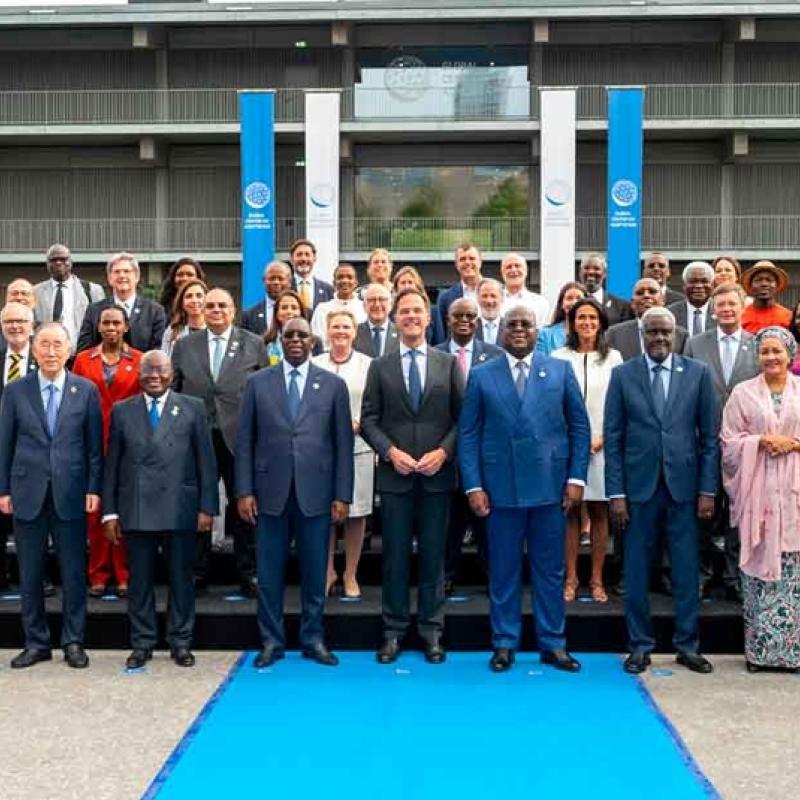
Blogs
Displaying 1 - 12 of 18
AAAP webinar: Innovation essential for climate-smart future, but it's not enough
Building resilience for food and nutrition security in the Horn of Africa (BREFONS)
The target countries of this project (Djibouti, Ethiopia, Kenya, Somalia, South Sudan, and Sudan) are located in the arid and semi-arid lands, which comprise more than 70% of the Horn of Africa (HOA) region, receive less than 600 mm of annual rainfall and are characterized by recurrent droughts and unpredictable rainfall patterns.
Despite the region’s considerable range of natural resources, with their huge potential for wealth and progress, the HOA countries are struggling to cope with their worsening ecological circumstances. Droughts are increasing in severity and frequency and their impacts are exacerbated by advancing desertification, land degradation, global warming, and climate change. These circumstances have created chronic vulnerability in the HOA, with persistent food insecurity, widespread economic hardships, conflicts, and migration. The strategic priorities of countries in the HOA are defined by their urgent need to build resilience to environmental and socio-economic shocks, through investing in sustainable development and optimizing the productivity of their resources.
Through building resilience to climate change, the overall objective of this program is to increasing, on a sustainable and resilient basis, productivity and agro-sylvo-pastoral production in the HOA, increase incomes from agro-sylvo-pastoral value chains and enhance the adaptive capacity of the populations to prepare for and manage climate change risks.
- Provide upstream technical assistance to ensure climate smart digital technologies for adaptation and resilience are integrated into the project.
- Identifying key agriculture adaptation constraints that can be addressed by digital technologies and develop solutions
- Assessing the conditions and opportunities for digital applications for drought index insurance
- Identifying opportunities for digital agricultural adaptation solutions through the preparing of climate risk and digital agriculture profiles
- Supporting stakeholders to identify and implement opportunities through the preparation of a digital agricultural adaptation toolkit
- Building the capacity of policymakers and enable policy interventions to ensure uptake of digital solutions using the toolkit.
- Feasibility studies and assessment on building resilience for food security in Africa;
- Feasibility studies to assess integration of adaptation and mitigation measures for the sustainability of nutrition and food security interventions;
- Quality assurance and advisory services for results and evidence-based planning, management and M&E of the Youth Enterprise Development project interventions
The programme will contribute to improving living conditions, including for women and the youth; improving food and nutrition security; increasing resilience; and peace and security in the HOA. Specifically it will:
- Productivity (crops and livestock) increased by 30%
- 50% increase in digital literacy for actors across value chains, of which 80% are women and youth
- 30% de-risked credit as a result of use of Digital Climate Advisory Services and Digital Financial Services
- 30% increase in use of index insurance products by smallholders across target value chains
- 55,000 additional jobs created (primarily for women and youth)
- 1.3 million farmers and pastoralists in the six countries use climate services (e.g. index insurance with a gender focus), allowing them to benefit from:
- Increased productivity and agro-sylvo-pastoral production in the Horn of Africa, on a sustainable and resilient basis
- Increased incomes (by 40%) from agro-sylvo-pastoral value chains
- More broadly, the population of the Horn of Africa have enhanced adaptive capacity to better prepare for and manage climate change risks and variation.
USD 210 million
Rapid Climate Risk Assessments for Five African Cities (Batch II)
Currently, Africa’s infrastructure needs are around USD 130–170 billion a year, with an investment gap of over 50–60% of that amount. Making Africa’s infrastructure resilient adds only an average of 3% to total costs, but every $1 spent could yield $4 of benefits.
The Africa Infrastructure Resilience Accelerator (Pillar 2 of the Africa Adaptation Acceleration Program (AAAP)) focuses on accelerating infrastructure resilience efforts on the continent. It will strengthen the enabling environment and provide the technical support to scale up investment in resilient infrastructure. It will also ensure that new and existing infrastructure uses nature-based solutions and create positive socioeconomic impacts and green jobs. By 2025, Pillar 2 of the AAAP aims to scale up investment at national and city level for climate-resilient infrastructure in key sectors such as water, transport, energy, and waste management, and integrate resilience in up to 50% (by value) of new infrastructure projects.
The City Adaption Accelerators (CAAs) will conduct Rapid Climate Risk Assessments (RCRAs) in target cities, which aim to improve climate adaptation and build resilience in urban areas.
The primary purpose of the RCRAs is to inform the identification and preparation of AfDB projects.
The RCRAs will inform the development of a comprehensive climate adaptation strategy and prioritization plan and are a crucial step towards the development of the CAA for each of the target cities. The overarching objective of the CAA is to create a shared strategic framework for GCA’s engagement in climate adaptation and resilience building in urban areas. The development objective of the CAA is to support cities and countries to strengthen their urban climate adaptation and resilience outcomes through enhanced (1) understanding; (2) planning; (3) investments; and (4) governance and capacity building
- informed future discussions surrounding climate adaptation investments
- technical guidance to firms towards developing well-informed analyses
- Literature review of vulnerability and adaptive capacity assessments of cities to climate change
- Scoping of past and current initiatives and key stakeholders relevant for adaptation and resilience building in cities.
- City Scan system established for a rapid review of actions around climate hazard and risk assessments and more locally focused assessments of vulnerability and adaptive capacity.
- Rapid Climate Risk Assessments prepared: readily available and accessible information on key climate hazards and associated risks; will indicate whether an in-depth climate risk assessment is required.
- City Scoping system established that provides insight into past and current initiatives relevant for adaptation and resilience building and identifies key stakeholders and relevant initiatives.
- Strengthened urban climate risk management for resilient cities;
- Equitable access to water resources that are well and sustainably managed created; Improved urban liveability and public health due to a reduction in climate risks stemming from heat stress and disease
~€45,000 per city (~€225,000 total)
Global Center on Adaptation, AfDB host regional forum on the future of resilient food systems in Africa
Digital Climate Adaptation Solutions Training- North Africa
Harnessing the power of technological innovations and digitalization to improve agricultural productivity and strengthen climate resilience has been recognized as one of the potential game changers to address many of pressing climate concerns and rural transformation challenges facing Africa today.
Digital climate-informed advisory services are tools and platforms that integrate climate information into agricultural decision-making. These services range from digital mobile apps, radio, and online platforms to digitally enabled printed bulletins based on climate models and extension services that utilize climate information platforms. DCAS offers crucial opportunities to build the resilience of small-scale producers in the face of worsening climate change impacts, particularly when bundled with complementary services (such as financing, input supply, market access, insurance).
The objectives of the DCAS trainings are as follows:
- Capacity enhancement for agricultural stakeholders across North Africa in DCAS
- Supporting trainees to improve their confidence and capacity to design and implement DCAS projects to reach the last mile and farmers for improved food security and climate resilience
- Facilitating knowledge/experience sharing of participants on contextual issues and approaches to scale up DCAS
- Increase the knowledge of stakeholders from across North Africa on opportunities and new approaches for the design, mainstreaming and use of digital tools and data-enabled agriculture to combat the effects of climate change
- enhancing capacity to use digital agriculture advisory services and solutions to ensure uptake by of DCAS among stakeholders in North Africa
- Over 50 Participants trained in digital agriculture and digital climate adaptation solutions
- A new cohort or platform of African public officials, researchers, farmers organizations leaders and agricultural NGO focal points with improved expertise in DCAS (for subsequent experience capitalization follow up and training)
- Training evaluation assessment report
- Improved understanding / knowledge of target stakeholders in North Africa through training and information sharing including lessons learned on the challenges, opportunities and new approaches to the design, mainstreaming and use of DCAS and data-enabled agriculture
- Enhanced capacity of selected agricultural stakeholders in public institutions and farmers groups across North Africa to use digital agriculture advisory solutions, implement digital climate smart advisory solutions, and train their members/colleagues to use DCAS tools
€100,000
Multi-Stakeholder Climate Risk Dialogue: Kenya-South Sudan link road refurbishment project
What: This is a private event
Where: Nairobi, Kenya
When: 25 April 2023, 9:00
The Multi Stakeholder Dialogue on Climate Hazards will be the opportunity to present and discuss the preliminary results and the initial climate hazard assessment to the project stakeholders.
Event description:
The Global Center on Adaptation (GCA) is organizing a Multi Stakeholder Dialogue on Climate Hazards, to support the Leseru-Kitale and Morpus-Lokichar road upgrade project, on Tuesday 25 April 2023 at 9am in Nairobi, Kenya.
This initiative is implemented as part of the African Adaptation Acceleration Program, a joint initiative from GCA, the African Union and the African Development Bank, to increase access to climate finance and mainstream climate adaptation in investment projects.
In this context, GCA is overall implementing the following activities to support the Leseru-Kitale and Morpus-Lokichar road upgrade project, with the consortium Royal HaskoningDHV, Lobelia, and Rebel Group:
- High granularity understanding and mapping of current and future climate hazards.
- Detailed climate risks assessment.
- Downstream adaptation and resilience options appraisal for the project, focused on Operations and Maintenance phase and Nature-based solutions if applicable.
- Technical guidelines for climate-resilient transport asset management.
Youth enterprise development and capacity building project
High youth unemployment is a major issue in South Sudan, being a cause and a consequence of fragility, and a source of political and social instability. Achieving and sustaining peace and development therefore requires employment opportunities for youth, who account for 72% of the population. The government is also faced with the challenge of reintegrating into the labour market South Sudan’s 1.6 million internally displaced people, 2.3 million refugees, and former members of armed groups, many of whom are youth.
However, the government does not have the required capacity; further undermined by the protracted conflict. The magnitude of the support required necessitates a strategic approach to assist priority institutions to drive implementation of the Revitalized Agreement on the Resolution of the Conflict in the Republic of South Sudan (R-ARCSS). Encouraging entrepreneurial skills and economic empowerment of youth is a key component of this, as well as supporting micro, small and medium-sized enterprises (MSMEs), which make up 92% of all businesses in the country.
The youth enterprise development and capacity building (YEDCB) project will enhance employability and job creation for young women and men aged 18–35 years in South Sudan through strengthening the private sector, building entrepreneurship skills, and creating an enabling policy and institutional environment. The project seeks to ensure that youth with the potential to grow as entrepreneurs are self-employed or can create employment for others through their sustainable businesses.
The main objectives are two-fold: (i) to increase employability of youth by facilitating access to skills development, business development support and financing; and (ii) to enhance public service delivery of employment and labour market related services through institutional and human capacity development of the relevant government and private sector institutions and agencies, especially to support MSME development and youth economic empowerment. Strategies to achieve this will include tailored training by selected business development service providers, delivered through integrated business, employment, and innovation hubs (iHubs) and a revolving fund will provide interest free loans (US$2,000–10,000) to youth-led MSMEs with potential to grow their businesses.
Beneficiaries will include rural and urban youth, ex-combatants, returnees, persons with disabilities, and some forcibly displaced youth (refugees and IDPs) alongside youth in hosting communities to foster social cohesion. The project will also build capacity in six government institutions, mainly ministries in related sectors (covering youth, finance, labour, trade and public services).
- Definition of the concept of “adaptation jobs”.
- Feasibility studies and assessment of job opportunities in adaptation that are to be carried out in Bank’s operations.
- Feasibility studies to assess integration of adaptation and mitigation measures for the sustainability of “adaptation jobs.
- Quality assurance and advisory services for results and evidence-based planning, management and M&E of the Youth Enterprise Development project interventions.
- 3,510 youth led MSMEs established (50% women-led).
- 5,573 jobs created by youth-led MSMEs (50% women).
- 2,550 youth join 85 registered and operational village savings and loan associations (VSLAs).
- 753 youth-led MSMEs access interest free loans (50% women-led).
- 3,036 youth trained in business development and entrepreneurship (50% women).
- 10 business linkages established between youth-led MSEs and markets at national and regional levels.
- 5 ministries provided with ICT equipment and 200 personnel trained (30% women).
- 1 online trade portal and online business registration centre established.
- Enhanced youth employment and employability by creating sustainable MSMEs in five states.
- Sustained growth through agricultural value chains, in agriculture, poultry and animal farming and fish.
- Expanded opportunities through increased and equitable access to productive capcity especially finance e.g. community-owned village savings and loan associations (VSLAs) model.
- Access to national and regional markets improved for youth-led MSMEs.
ADF – USD 5.40 million
UNDP – USD 0.66 million
Government of S.Sudan – USD 0.30 million
Total - USD6.36 million



